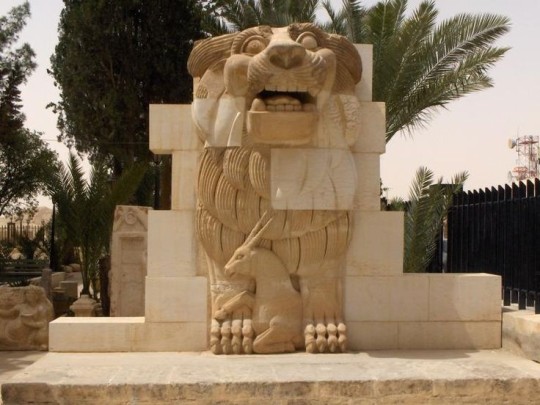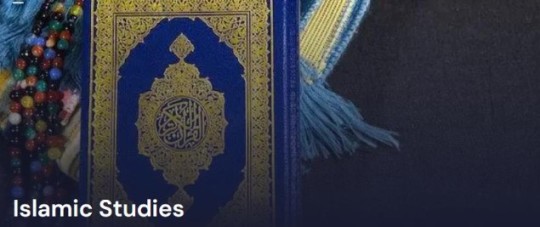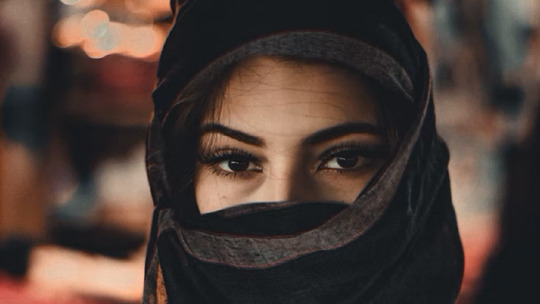#Islam for beginners
Explore tagged Tumblr posts
Text

Islam for Beginners I: "Now Do Muslims!"
Because I often criticise Christianity, some Christian friends have suggested, "Now do Muslims!" They join a chorus of similar anonymous grumbles. I criticise Islam (and Hinduism and Judaism and others) regularly but they only notice when their religion is put under the spotlight.
The right-wing Christian obsession with trashing Muslims is also a recurring problem among stand-up comedians. Both popular light entertainer Dara O’Briain and tortured sarcastic intellectual Stewart Lee were forced to address it in their sets.
As someone who writes satirical articles about the Catholic Church, I also write satire about Islam but not in a way that Christian critics would like. I get the recurring impression that well-researched, well-written Islamic-themed comedy is not what they’re looking for at all.
O’Briain and Lee and myself wrangle with Christianity because we come from Christian traditions. We know exactly which parts of the religion are ridiculous and which parts we can discuss with confidence. Sometimes I feel like nothing will satisfy the "Now do Muslims" crowd except hateful invective.
Muslims
Segal's Law states that a man with a watch knows what time it is but a man with two watches is never sure. Talk to one Muslim and you think you’ll have a handle on Islam. Talk to two and you will never be sure.
There are wildly divergent interpretations about even the most generic aspects of Islam. Whenever you read “Muslims think X...” or hear “Muslims believe Y...” there is a great chance that whatever follows will be wrong. An example is when the leadership of Al-Qaida thought the problem with Iran is they’re too pro-American. There is no way to shove this into any standard Western narratives of “what Muslims think”.
A recent survey of Indian Muslims revealed that 6% of them don’t believe in a god. This was around twice the percentage of Hindus and Christians who gave the same answer. Indian Muslims don’t have to worry about atheism, however. The same survey revealed that (nearly 20%) more of them think avoiding pork is more important to Islam than believing in a god.
In the West, we have been trained to see “Muslims” as a monolithic block of opinion. Whenever we see them on the news, it’s usually because some of them have been out murdering again. These people are often referred to as “hardcore Muslims” or “Muslim fundamentalists”. We are being nudged towards the conclusion that the more violent Muslims are, the closer they are to the “real” Islam. There is not much evidence to support that conclusion.
In 2015, Muslims in India (which has the third-largest population of Muslims in the world) demonstrated in support of France during the Islamist attacks in Paris. Muslims in the Maghreb will be less tolerant of France’s shenanigans. It’s not coherent, therefore, to say that “Muslims” either support France or don’t support France. Some do and some don’t and these positions will be driven by politics more than religion.
"Now Do Muslims!"
I will! This is the first article in a series I will post throughout Ramadan called "Islam for Beginners" (some of which will be based on articles I wrote for OnlySky Media). They will deal with the most sensitive and salient issues I see among Western commentators. I have done lots of research (including reading the entire Koran) and read lots of commentaries and spoken to lots of Muslims and boiled it all down into nice Tumblr-post-sized chunks.
Disclaimer 1: If you expect to read a defence of Islam as if it were based on some universal or demonstrable truth, you will be disappointed. I reject any and all supernatural claims made by everyone and everything in Islam. Disclaimer 2: If you expect to read excoriating diatribes trashing Muslims, or glib mockery, you will also be disappointed. I’m not interested in enabling racists or xenophobes.
Western media has at best neglected Islam and Muslims and at worst intentionally misrepresented them. We may not be there yet, but I’d like to nudge the public discourse towards a place where Islam can be robustly criticised without accusations of bigotry and the human rights of Muslims can be robustly defended without accusations of Islamist apologism. At the very least, I'm hoping to start some interesting conversations.
21 notes
·
View notes
Text
Major Beliefs of Islam Explained

Islam is a monotheistic religion with a well-defined set of beliefs that guide its followers, known as Muslims, in their understanding of the universe, their purpose in life, and their relationship with God. These core beliefs form the foundation of Islamic faith and practice, shaping every aspect of a Muslim’s life. For those new to Islam, understanding these key concepts provides insight into the principles that unify Muslims across the world.
Belief in the Oneness of God (Tawhid) At the heart of Islamic belief is the concept of Tawhid, or the oneness of God. Muslims believe that Allah (the Arabic word for God) is the sole creator and sustainer of the universe. This belief emphasizes that God is unique, eternal, and without any partners or equals. The Shahada, the Islamic declaration of faith, encapsulates this belief: “There is no god but Allah, and Muhammad is His messenger.” It is the cornerstone of Muslim identity and signifies a commitment to monotheism.
Tawhid is not only a theological statement but also a guiding principle for how Muslims live their lives. It teaches that everything comes from Allah and that worship should be directed to Him alone. This belief fosters a sense of humility and dependence on God, encouraging Muslims to live a life of gratitude and devotion.
Belief in Angels Major beliefs of Islam Muslims believe in the existence of angels (Malaika), spiritual beings created by Allah from light. Unlike humans, angels do not have free will and are entirely obedient to God’s commands. They play various roles, such as delivering God’s messages, recording human deeds, and protecting individuals. The angel Gabriel (Jibril) is particularly significant in Islamic tradition, as he delivered the Quran to the Prophet Muhammad over 23 years.
The belief in angels is a reminder of the unseen aspects of reality that exist beyond human perception. It emphasizes that the universe is filled with beings that carry out divine tasks, reflecting the grandeur and order of Allah’s creation.
Belief in Divine Scriptures Muslims believe that throughout history, Allah revealed scriptures to various prophets to guide humanity. These include the Torah (Tawrat) revealed to Moses (Musa), the Psalms (Zabur) revealed to David (Dawud), and the Gospel (Injil) revealed to Jesus (Isa). However, Muslims believe that these earlier scriptures were either lost or altered over time.
The Quran is considered the final, complete, and unaltered revelation from God, revealed to the Prophet Muhammad. It serves as a comprehensive guide for all aspects of life, covering themes such as worship, morality, law, and social interactions. Muslims regard the Quran as the ultimate source of divine guidance, to be read, memorized, and implemented in daily life.
Belief in Prophets Prophethood is a central aspect of Islamic belief. Muslims believe that Allah sent prophets throughout history to guide humanity towards the truth. The Quran mentions 25 prophets by name, including Adam, Noah (Nuh), Abraham (Ibrahim), Moses, and Jesus. Each prophet delivered the message of monotheism and instructed their communities to worship Allah alone.
Muhammad is considered the last and final prophet, often referred to as the Seal of the Prophets. His life and teachings, recorded in the Hadith (sayings and actions of the Prophet), are seen as a practical example of how to live according to Islamic principles. Muslims believe that no further prophets will come after Muhammad, and that the message he delivered completes the guidance provided by Allah.
Belief in the Day of Judgment The belief in the Day of Judgment is another fundamental concept in Islam. Muslims believe that at the end of time, all humans will be resurrected and judged by Allah based on their actions in this world. Those who lived righteously and followed God’s guidance will be rewarded with eternal paradise (Jannah), while those who rejected faith and acted unjustly will face punishment in hell (Jahannam).
This belief emphasizes accountability and encourages Muslims to live a life of moral integrity. It serves as a reminder that every action has consequences, and that ultimate justice rests with God. The anticipation of the afterlife motivates Muslims to strive for good deeds, seek forgiveness, and maintain a constant awareness of their spiritual state.
Belief in Divine Decree (Qadar) Muslims believe in Qadar, or divine decree, which means that Allah has knowledge of all that happens in the universe and that everything unfolds according to His will. While humans have free will to make choices, Muslims believe that Allah’s knowledge encompasses past, present, and future, and that His wisdom guides the unfolding of events.
This belief in divine decree does not negate human responsibility but rather provides comfort and perspective during times of hardship and uncertainty. It teaches Muslims to trust in Allah’s plan and to find peace in the belief that everything happens for a reason.
Conclusion: A Path to Understanding the Universe and Beyond The major beliefs of Islam provide a framework for understanding the nature of God, the purpose of life, and the principles of human behavior. These beliefs guide Muslims in their quest for spiritual fulfillment and help them navigate life’s challenges with faith and resilience. For those new to Islam, these concepts offer a glimpse into a worldview that emphasizes the unity of God, the importance of moral conduct, and the eternal nature of the soul. As one delves deeper into these beliefs, the beauty and depth of Islamic teachings become clearer, offering a path toward inner peace and a sense of purpose.
0 notes
Text
This new generation is cooked man, can’t even mention you’re religious or grew up religious without people assuming you’re a bigot or a genocide Nazi sympathizer.
Muslim? Must be a terrorist 🙄
Jewish? Must be a Zionist 🙄
Christian? Must be a bigot
Catholic? Don’t even mention it without risk of people wanting to burn you at the stake
Being religious or raised in a religion doesnt automatically mean or make someone the bigoted, racist , intolerant rhetoric or ideals others have made and placed upon these religions
Yes there are bigots and nasty people that use religion to try and justify their hate and violence against others, that is NOT okay. Nor is it okay to assume everyone that has religious ties thinks the same way.
Long story short: can’t even mention you have religious ties without being picked apart for it
As always free Palestine , fuck the government, punch Nazis
#witchtok#pagan witch#baby witch#witchblr#witchcraft#witch#witch community#witches#witchythings#beginner witch#religious#religion#catholic#christianity#islam#muslim#judaism#Jewish
16 notes
·
View notes
Text
29 Mayıs 1453 İstanbul'un Fethi Prophet Muhammad (pbuh) said: ". Konstantiniyye One day it will definitely be conquered. How good are the soldiers who conquer it and how good is the commander who conquers it."happy brithday Konstantinopolis♥️
dailymotion
#istanbul#poem#türkiye#cats of tumblr#doodle#beginner artist#atatürk#cute#character art#cat#mha#recep tayyip erdoğan#erdogan#cumhurbaşkanı erdoğan#this is crazy#islamic#artificial intelligence#allahummabarik#allahuekber#allahﷻ#allah#allanimanga#allah is kabir#edgar allan poe#allahumma ameen#good morning#iyi aksamlar#iyi günler#iyi akşamlar#iyi geceler
2 notes
·
View notes
Text
Beginner Student
Q: Noble Shaykh, may Allah grant you success. Must al-mubtadá (ie: a beginner student) adhere strictly to a particular maḏhab, or is it permissible for him to adopt rulings from one maḏhab in some matters and from another in others? س: فضيلة الشيخ وفقكم الله، هل يجب على المبتدئ أن يقلد على مذهب معين أو يجوز له أن يأخذ بشيء من مذهب، وشيء آخر من مذهب؟ A: al-mubtadá should study—by Allah, you should study under al-ʿulamāʾ (ie: the scholars), learn properly, and then come to know the truth, Allah willing. It is essential to engage in proper study. ج: على المبتدئ أن يدرس الله يصلحكم يدرس على العلماء ويتعلم وبعدين يعرف الحق إن شاء الله لازم من الدراسة. Ṣāliḥ al-Fawzān, Sharḥ Kitāb al-Durr al-Naḍīd fī Ikhlāṣ Kalimat al-Tawḥīd li ʿl-Shawkānī 16/3335 #630 صالح الفوزان، شرح كتاب الدر النضيد في إخلاص كلمة التوحيد للشوكاني ١٦/٣٣٣٥ #٦٣٠ https://youtu.be/HfKm_PKaX8E?t=3335s Telegram: https://t.me/aljadwal Tumblr: https://al-jadwal.tumblr.com
3 notes
·
View notes
Text
Word list: religion part 2, Smaller christian religions, irreligion, Islam, Judaism
Herätysliike - revivalist movement Vanhoillislestadiolaisuus - Conservative Laestadianism Baptismi - baptism Diakonia - social work done by a church Metodismi - Methodism Pelastusarmeija - The Salvation Army Adventtikirkko - divine service of the Advent Islaminusko / Islam - Islam Juutalaisuus - Judaism Heprea - Hebrew Jiddish - Yiddish Lähi-Itä - Middle east / Near east Abrahamilainen - Abrahamic Jatkosota - Continuation War Tataari - Tatar Ateismi - atheism

#finnish#langblr#langblog#finland#beginner finnish#suomi#suomen kieli#learning finnish#finnish language#religion#islam#judaism#atheism
11 notes
·
View notes
Text
Al-Uzza – Altarabische Göttin des Morgensterns
In vorislamischer Zeit war Al-Uzza Schutzgöttin von Mekka. Ihr Heiligtum ar Suquam bei Mekka.


Segensvoller Neubeginn
In vorislamischer Zeit war Al-Uzza Schutzgöttin von Mekka. Ihr Heiligtum ar Suquam bei Mekka. Hier soll der Prophet Mohammed, dessen Stamm diese Göttin besonders verehrte, selbst ihren schwarzen Stein in die Kaaba gelegt haben.
Bevor der Islam sich durchsetzen konnte, versahen Priesterinnen ihren Kult. Auch später noch nannten sich die Wächter der Kaaba „Söhne der Alten Frau”. Drei Akazien stellten dort ihren Thron dar, die Göttin selbst lebte in einem Baum.
Sie wird als Starke, Gewaltige und Mächtige verehrt und verkörpert den jungfräulichen Kriegeraspekt. Al-Uzza steht sowohl für den Aspekt der Liebe, als auch den des Krieges, indem sie für Selbstsicherheit steht und in Kriegs- oder Kampfsituationen Schutz gewährt. Sie wird oft in Kampfesrüstung dargestellt.
Göttin des Neubeginns
Al-Uzza kündet den neuen Tag an und ist damit auch die Göttin für einen kräftigen und segensvollen Neubeginn. Al-Uzza ist als jungfräuliche Kriegerin und Jüngste ein Aspekt der dreifachen Göttin gemeinsam mit Manat (Abendstern) und Al-Lat (Mond).
In einer anderen Auslegung ist die Göttin Al-Lat in drei Göttinnen eingeteilt: Q´re ist der zunehmende Mond oder die Jungfrau. Al-Uzza ist die Starke, also der Vollmond, die Muttergöttin an sich. Zuletzt Manat, die abnehmende aber auch weise Schicksalsgöttin.
Interessant ist hier vor allem die Jungfrau Q´re, die sich auch in der griechischen Kore wiederfindet. Der Koran erwähnt sie in Sure 53, 19-23. Ihre Anrufung als Fürsprecherin bei Allah war von Mohammed einige Zeit erlaubt, wenig später jedoch als Götzenverehrung verboten.
Mohammed bekämpfte den Kult der Göttin als Unglauben und ließ das Heiligtum der Al-Uzza, in dem sich nach einigen Überlieferungen auch ein Orakel befunden haben soll, nach der Eroberung Mekkas zerstören. Der Glaube an sie überlebte dennoch im Islam, indem sie im Koran als eine der drei Töchter Allahs erwähnt ist.
Katzen und Delphine
Heilig sind ihr Katzen, vor allem große Raubkatzen. In der Stadt Petra gibt es ihr zu Ehren einen Tempel der geflügelten Löwen.

All-Uzza hilft bei Liebesangelegenheiten, bei unterstützenden Bindungen, bei neuen Entwicklungen, sie ist die Beschützerin von Frauen, die in Gefahr sind und hilft ihnen dabei, ihre innere Stärke zu entwickeln und sich zur Wehr zu setzen. Sie unterstützt Frauen, ihre Zuversicht und Wachsamkeit (eine Katzenkraft!) zu stärken.
Darüber hinaus begleitet und beschützt Al-Uzza auch Schiffe auf ihren Reisen über den Ozean (Morgenstern). Sie wird auch als Delphin symbolisiert, der entlang der Schiffe schwimmt und sie bewacht.
Quelle
#hexe#magick#witch community#witchcraft#baby witch#witch tips#beginner witch#pagan witch#chaos magick#witchblr#al uzza#aluzza#al-uzza#morgenstern#pre islamic#löwe
5 notes
·
View notes
Text
Learn Islam From Home: Benefits of Online Islamic Classes

Among the main benefits of Islamic studies courses is the chance to study under qualified academics. Many Islamic courses are designed to provide a thorough understanding of the Quran, Hadith, and Islamic law. Online courses connect students with competent teachers who guide them via real Islamic teachings. This guarantees that students have the chance to question and participate in debates as well as get correct information.
Visit Us: https://www.edocr.com/v/oxz34wpj/TarteeleQuranau/learn-islam-from-home-benefits-of-online-islamic-c
#Islamic studies courses#islamic prayers#muslim prayer#online quran classes for beginners#learn quran online with tajweed
0 notes
Text
Unlocking Knowledge: Online Courses in Arabic Language, Islamic Studies, and Quranic Sciences
In today's interconnected world, the pursuit of knowledge has transcended traditional boundaries, with online platforms offering unprecedented access to education. For individuals seeking to deepen their understanding of Arabic, Islamic studies, Quranic sciences, and related disciplines, online courses provide a flexible and comprehensive learning environment.
Learn Arabic Online
Mastering the Arabic language is essential for engaging with Islamic texts in their original form. Online Arabic classes cater to various proficiency levels, from beginners to advanced learners, focusing on grammar, vocabulary, and conversational skills. These courses enable students to read classical texts and communicate effectively in Arabic.
Islamic Studies Online
Online Islamic studies programs offer a broad exploration of Islamic theology, history, jurisprudence, and philosophy. Students can delve into subjects such as Aqeedah (creed), Fiqh (Islamic jurisprudence), and Hadith studies, gaining a holistic understanding of Islam's rich intellectual tradition.
Quranic Studies
Quran Recitation and Memorization
Learning to recite the Quran with proper Tajweed (pronunciation) is a fundamental aspect of Islamic practice. Online Tajweed courses guide students through the rules of pronunciation, ensuring accurate and melodious recitation. Additionally, Quran memorization programs support learners in committing the holy text to memory, fostering a deeper spiritual connection.
Quranic Interpretation (Tafseer)
Tafseer courses provide insights into the meanings and contexts of Quranic verses. By studying Tafseer, students gain a nuanced understanding of the Quran's guidance, enabling them to apply its teachings thoughtfully in their lives.
Ijazah Certification
For those aspiring to teach the Quran, obtaining an Ijazah—a certification granting permission to teach and recite the Quran—is a significant achievement. Online Ijazah programs connect students with qualified scholars who provide personalized instruction and assess proficiency, ensuring the transmission of authentic Quranic knowledge.

Benefits of Online Learning
The advantages of pursuing these studies online are manifold:
Flexibility: Online courses accommodate diverse schedules, allowing learners to progress at their own pace.
Accessibility: Students worldwide can access quality education without geographical constraints.
Diverse Resources: Interactive platforms offer a variety of learning materials, including videos, readings, and live sessions with instructors.

Community Engagement: Virtual classrooms foster a global community of learners, facilitating discussions and shared experiences.
Institutions like Iqra Institute exemplify the commitment to providing comprehensive online education in these fields. By embracing online learning, students embark on a transformative journey, enriching their knowledge and spiritual practice in the realms of Arabic language and Islamic studies.
#Learn Arabic online#Online Arabic classes#Arabic language courses#Islamic studies online#Online Islamic courses#Quran classes online#Learn Quran online#Tajweed courses online#Online Tajweed lessons#Tafseer classes online#Online Tafseer courses#Ijazah certification online#Online Ijazah programs#Quran memorization online#Online Quran recitation#Islamic education online#Arabic for beginners#Advanced Arabic courses#Quranic Arabic classes#Online Quranic studies#Islamic theology courses#Shariah courses online#Hadith studies online#Fiqh courses online#Online Islamic history classes#Learn Tajweed rules#Quranic interpretation online#Online Quran tutoring#Arabic grammar courses#Classical Arabic lessons
1 note
·
View note
Text

Islam for Beginners II: Hijab Confab
The Koran instructs Muslim women to be modest in their dress partly to publicly identify with Islam and partly to avoid sexual assault. Since AD 630, we have come to understand that the sexual assault of women is not caused by how sexy they look but by male control issues. Human rights groups and feminists universally advise that placing responsibility on the prospective victim is a counter-productive approach to reducing sexual assaults. The Koran seems to acknowledge this in part when it instructs men in particular to "lower their gaze and guard their chastity".
If the object of Islamic modesty is to protect women, it’s not working. Sexual harassment is prevalent in the Muslim world, even in Mecca during the Hajj. The modesty rules of Islam do nothing to stop sexual harassment of women and sometimes make things worse.
In fact, there is almost a directly proportional relationship between a country’s legal dress codes and women’s rights. While women should feel free to wear whatever they like, freedom means nothing if governments punish women for not wearing particular items for supernatural reasons.
A quick tour of Afghanistan
The black burqa is not, and never has been, a part of traditional Afghan culture. It is a recent imposition by Islamic fundamentalists on the women of Afghanistan. Of course, some women insist that they are honouring their Islamic values by following the hijab rules but the Koran says nothing at all about burqas. It only mentions the khimar (veil) and the jilbab (dress).
The Taliban’s “strict interpretation of Sharia” seeks not only to control women but to eliminate the feminine anywhere it cannot be directly controlled by a man. In 2022, the Taliban ordered women to wear the burqa or “stay at home”. Later that year, the Taliban banned women from universities.
Any explanation for the compulsory burqa which involves serving the interests of women is repudiated by the fact that the Taliban “have institutionalised oppression against women” at every level of society.
A quick tour of Iran
In 1936, the fascist government of Iran led by the Shah passed a law called Kashf-e hijab banning all Islamic veils. This was part of a larger effort to Westernise the country. Women were beaten, their headscarves and chadors torn off and their homes were forcibly searched.
In 1983, the theocratic government of Iran led by the Ayatollah made Islamic veils mandatory for all women. Women who violate the law can be jailed or fined for appearing in public without the hijab.
Two patriarchal Iranian governments managed to come to completely opposite conclusions about the hijab while uniformly removing the agency of Iranian women.
A 2020 survey, in line with previous surveys, showed that 72% of the population opposed the compulsory hijab. This figure must include some hijabis. This September, after the morality police beat a woman to death, many Iranian women from all sections of society risked their lives to protest. Demonstrations are ongoing. In response, the government has assured protestors they are “working” on whether the law needs to change.
Any explanation for the compulsory hijab which involves serving the interests of women is repudiated by the fact that the women in Iran “continue to be treated as second class citizens”.
Oppressive or empowering?
For many women who live where not wearing the hijab has serious political or social consequences, the hijab will be a symbol of oppression and violence. In these places, the correct response for those of us interested in freedom and justice is to support women who choose not to wear the hijab.
In Iran, the law mentioned above states that women “who appear in public places and roads without wearing an Islamic hijab, shall be sentenced to ten days to two months’ imprisonment or a fine of fifty thousand to five hundred Rials.”
For many women who live where wearing the hijab has serious political or social consequences, the hijab will be a symbol of defiance and empowerment. In these places, the correct response for those of us interested in freedom and justice is to support women who choose to wear the hijab.
In India, for instance, earlier this year, women were refused entry to their classrooms because they were wearing hijabs. Groups of men often harass and intimidate women in the street for how they choose to dress by chasing them and screaming Hindutva (Hindu fascism) slogans. In this video which went viral in the Muslim world, one very brave girl is reduced to screaming “Allahu Akbar” to defend herself against a Hindutva mob. There is a political context here that matters. The relationship of India with its Muslim population could be summarised as a series of massacres.
It’s otiose to pretend there’s no context to anything and if some ex-Muslim (and Muslim) women understandably hate the hijab, then it must necessarily be always stupid and dangerous or if some Muslim women embrace the hijab, then it must necessarily be always amazing and empowering. The intersection of religion and politics is never that simple.
9 notes
·
View notes
Text
what is the Best way to Learn the most beautiful Verses of the Holy Quran?
Are you eager to learn Quran online and dive into the profound beauty of the 10 beautiful verses of the Holy Quran? Madrasat El-Quran is your perfect gateway! Through our Quran School website, we offer top-tier online learning courses tailored for students in the United States of America.

Enroll now in our Quran Tajweed Course and master the Holy Quran with precision and grace. Don’t miss the opportunity to connect deeply with the sacred text — start your journey today!
0 notes
Text
Step-by-Step Guide to Salah: Performing Islamic Prayer Correctly
Salah, also known as Islamic prayer, is a fundamental pillar of Islam. It’s a direct connection between a Muslim and Allah (God). This guide will explain each step of performing Salah, along with its significance. Preparing for Prayer: Ensuring Purity and Focus Cleanliness (Wudu or Ghusl): Before prayer, Muslims achieve a state of ritual purity by performing either wudu (ablution) or ghusl…
#Benefits of performing Salah#Completing Salah with Salaam#Daily Muslim prayers#digital islamic guide#digitalislamic#digitalislamicguide#Facing the Qibla for Salah#Guide to Salah for beginners#How to do wudu before Salah#How to perform Salah#Importance of Salah in Islam#Islamic prayer steps#Ruku and Sujud in Salah#Salah prayer#Steps for Salah#Surah recitation in Salah#Tashahud in Salah#What to recite during Salah
0 notes
Text
dailymotion
#istanbul#poem#türkiye#cats of tumblr#doodle#beginner artist#atatürk#cute#character art#cat#mha#crazy girl#going crazy#this is crazy#am i crazy#crazy#recep tayyip erdoğan#erdogan#i need to ⭐️rve#news#news website#news word#news world#islamic#jujutsu kaisen#allahuakbar#allahumma ameen#allahﷻ#allahummabarik#allanimanga
1 note
·
View note
Text
1st Day of Hajj Complete Step by Step Hajj Guide the rituals of the Haj pilgrimage to Makkah #haj
#hajj #hajj2024 #macca #madinah #kabah #muslim #umrah #islam #hajjjourney #blessed #pilgrimage # #الحج #مكة #المد��نة #كعبة #مسلم #عمرة #إسلام #رحلةحج #مبارك #مكرمة #مناسكالحج #مشعر #عرفة #مزدلفة #مزدلفه #مشعر_عرفة #منا #hajjvlogs #hajjguide #learnhajj #hajjtips #hajjpreparation #hajjexperience #prayforhajj #hajjrituals #hajjmubarak #hajjday #hajjaccepted #alhamdulillah #duasforhajj #makkah…
View On WordPress
#alhamdulillah#blessed#duas for hajj#explore hajj#hajj#hajj 2024#hajj day#hajj experience#hajj for beginners#hajj guide#hajj journey#hajj mabroor#hajj moments#hajj mubarak#hajj preparation#hajj rituals#hajj tips#hajj vibes#hajj vlogs#hajjaccepted#islam#kabah#learn hajj#macca#madinah#makkah#muslim umrah#pilgrimage#pray for hajj#types of hajj
0 notes
Text
3 Reasons Women Should do Charity
The Prophet Muhammad (ﷺ) once addressed a group of women and encouraged them to give charity. He said that he had seen that most of the people in Hell were women. The women asked why this was so. Why Women Should Be Mindful Women often curse and are ungrateful to their husbands. Women can be led astray easily. Women have some deficiencies in their intelligence and religion. What Are These…
View On WordPress
#ablution in islam women#anwarul islam women&039;s arabic college mongam#are men and women equal in islam#are women allowed to work in islam#beauty of islam women#best women in islam#brave women in islam#british women convert to islam#can men and women just be friends islam#can women do business in islam#can women drive in islam#can women fast during periods in islam#can women remove body hair in islam#can women shave their face in islam#can women use razor in islam#can women wear jeans in islam#can women work in islam#convert to islam women#divorce in islam women#dress code for women in islam#great women of islam book#hadith about women#how do women pray in islam#how to pray correctly islam women#islam about women job#islam beautiful women#islam for beginners women#islam woman convert#islam woman documentary#islam women
0 notes
Text
Al-Lat – Arabische Mondgöttin
Al Lat ist die ursprüngliche göttliche Kraft im Kulturraum, der heute die arabischen Länder umfasst. Als “Große Mondmutter” ist Al Lat die universelle Kraft des Wachstums der Mutter Erde und ihren Früchten und die Gebieterin der Milch.
Die nährende Matriarchin

Al Lat ist die ursprüngliche göttliche Kraft im Kulturraum, der heute die arabischen Länder umfasst. Als “Große Mondmutter” ist Al Lat die universelle Kraft des Wachstums der Mutter Erde und ihren Früchten und die Gebieterin der Milch.
Aus ihren Brüsten fließt das milchig weiße Mondlicht und die Milchstraße wie nährende Milch, was auch heute in mondhellen Nächten gut nachzuvollziehen ist. Das Mondlicht ist auch Symbol für die lebensspendende Kraft der ersten Nahrung.
Die vom modernen Islam zu Allah maskulinisierte große Mutter ist eine der ältesten Personifikationen der Großen Mondgöttin. Aus der weiblichen Gottheit al-Lat (der Milchspendenden – vgl. „Latte” bzw. „Lait” im italienischen und französischen) wurde im Laufe der Zeit der männliche Gott Allah.
Sie war herrschende Göttin der AraberInnen. Unter den Namen Manat (Göttin des Schicksals), Al-Lat (Sonnengöttin) und Al Uzza (Göttin der Macht) wurden die drei Aspekte der Großen Mondgöttin von den AraberInnen und den koreischitischen MohammedanerInnen in ältesten Zeiten geehrt.
In dieser Trinität verkörpert Al-Lat den mütterlichen Aspekt. Sie ist mit der Erde und ihren Früchten verbunden, regiert über die Fruchtbarkeit und die Regeln des menschlichen Zusammenlebens sowie über die universellen Gesetze. Vereinbarungen wurden daher über Jahrtausende mit der Formel “Bei dem Salz, bei dem Feuer und bei Al-Lat, der Größten aller Götter” besiegelt.
Die göttlichen Wort der Kore
In einer anderen Auslegung dieser Göttinnen-Triade ist Al-Lat in drei Göttinnen eingeteilt: Q´re ist der zunehmende Mond oder die Jungfrau. Al Uzza ist die Starke, also der Vollmond, die Muttergöttin an sich. Zuletzt Manat , die abnehmende aber auch weise Schicksalsgöttin. Interessant ist hier vor allem die Jungfrau Q´re, die sich auch in der griechischen Kore wiederfindet.
Der moslemische Koran, die ‘mohammedanischen’ Schriften, die überhaupt nicht auf Mohammed zurück gehen, ist eine Version des göttlichen Wortes der Kore (Q’re). Diese Göttin wurde von den Koreischiten (Kinder der Kore ), dem Stamm, aus dem Mohammed stammt, verehrt.
Der ursprüngliche Text des Koran wurde lange vor Mohammed von den heiligen Imamen niedergeschrieben. Das Wort Imam ist mit dem semitischen ima (“Mutter”) verwandt. Wie die Mahatmas oder “Großen Mütter” in Indien waren auch die Imame ursprünglich Priesterinnen des alten arabischen Matriarchats.
Der schwarze Stein und der halbe Mond
Bevor Arabien unter das Joch des Islam fiel, huldigte die dortige Bevölkerung der dreifachen Mutter Al-Lat, Al-Uzza und Manat lauteten. Es grenzt schon an Ironie, dass der berühmte ‘Schwarze Stein’ in Mekka, der jetzt in der Kaaba eingelassen ist, einstmals die Göttin, die Großen Mondmutter Al-Lat verkörperte, mit ihrem Geschlechtssymbol versehen war und seit Alters her von den Koreischiten (den Verehrerinnen der Göttin Kore) gehütet wird.

An diesem Ort versammeln sich die Männer und Frauen während ihrer Pilgerfahrt, um das zu küssen, was einstmals das anikonische Abbild der Großen Göttin war. Noch heute pilgern tausende von gläubigen MuslimInnen nach Mekka, um dort das Heiligtum den Schwarzen Stein aufzusuchen und ihrem Gott Allah zu huldigen.
Das Symbol der Göttin Al-Lat ist der Halbmond, der heute auf Flaggen islamischer Staaten zu sehen ist – oft auf blutrotem Hintergrund. Der Koran erwähnt sie in Sure 53, 19-23. Ihre Anrufung als F��rsprecherin bei Allah war von Mohammed einige Zeit erlaubt, wenig später jedoch als Götzenverehrung verboten.
Al-Lat unterstützt Frauen, die in einer Lebensphase sind, die von ihnen einen mütterlichen, nährenden Aspekt abverlangt.
Sie gibt ihnen die Kraft in einem selbstverständlichen Fluss zwischen geben und nehmen zu sein und wie der Mond ihren Zyklen nachgehen zu können. Frauen können sie auch für allen Arten von magischer Unterstützung bitten, ausgenommen für Bindungen (dafür ist Al Uzza zuständig) und für das Bannen (dafür wird Manat gebeten).
Quelle
#hexe#magick#witch community#witchcraft#baby witch#witch tips#beginner witch#pagan witch#chaos magick#witchblr#al-lat#allat#göttin#halbmond#pre islamic
2 notes
·
View notes